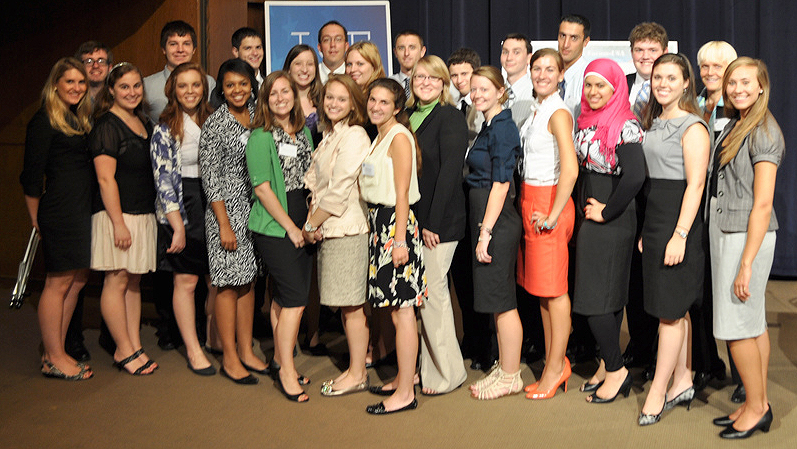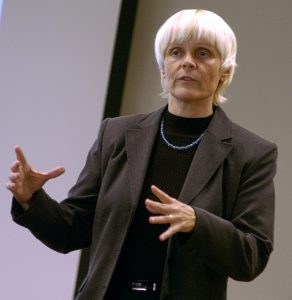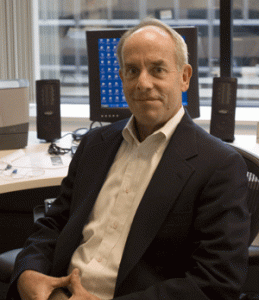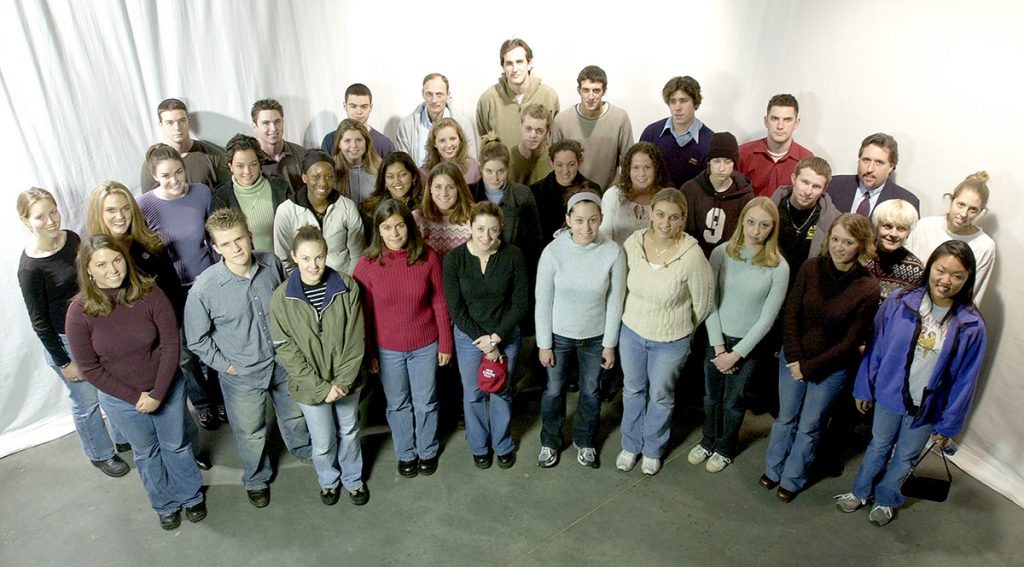
From the year 2000 through 2023 hundreds of people – the faculty, students, staff, advisers and friends of Elon University – worked to compile this valuable resource. It identifies the positives, negatives and potential solutions to the emerging complications of communications evolution as it illuminates people’s hopes and fears for the future of the human network in the digital age.
The most important contributors are the participants in our research: We are especially thankful for the contributions of the many thousands of people who have invested their precious time in sharing their views in response to our surveys and canvassings online and in-person and in video and audio interviews at events. A fair share of the most knowledgeable contributors have spent an hour or more annually across a span of two decades contributing their insights to our “Future of the Internet” surveys. Their contributions are vital to identifying the key issues to attend to today to plan for the best possible tomorrow.
People of the Imagining the Internet Center
 Janna Quitney Anderson, a professor of communications at Elon University, has served as the director of the Imagining the Internet Center since its first project in 2000. Since the Imagining the Internet Center was rebranded in 2024 as Imagining the Digital Future, she has continued to co-author the center’s digital future experts reports as well as managing the Imagining the Internet Center site’s original archive. Anderson served as lead writer for the majority of the more than 50 reports linked on this site, including all of the Elon-Pew research reports posted. She is frequently quoted in media coverage of these issues and she is sought out by government and businesses to share her expertise. She is the author of the book “Imagining the Internet: Personalities, Predictions, Perspectives” (Rowman & Littlefield) and the lead author of the “Future of the Internet” book series, published by Cambria Press.
Janna Quitney Anderson, a professor of communications at Elon University, has served as the director of the Imagining the Internet Center since its first project in 2000. Since the Imagining the Internet Center was rebranded in 2024 as Imagining the Digital Future, she has continued to co-author the center’s digital future experts reports as well as managing the Imagining the Internet Center site’s original archive. Anderson served as lead writer for the majority of the more than 50 reports linked on this site, including all of the Elon-Pew research reports posted. She is frequently quoted in media coverage of these issues and she is sought out by government and businesses to share her expertise. She is the author of the book “Imagining the Internet: Personalities, Predictions, Perspectives” (Rowman & Littlefield) and the lead author of the “Future of the Internet” book series, published by Cambria Press.
Anderson actively involved hundreds of undergraduate students in nearly every documentary multimedia project of the center between 2000 and 2019, and she innovated new college courses centered around educating them about Internet issues by training them as near-real-time multimedia journalists and traveling with them to conduct documentary coverage and video surveys at dozens of major national and international Internet policy events, including the UN-facilitated Internet Governance Forum and IGF-USA, World Summit on the Information Society, ITU, Internet Society and Internet Engineering Task Force conferences. Students were heavily involved in the production of the “Event Coverage” and “Forward 150/Back 150” sections of this site, both of which were not funded by Pew.
 The inspiring force behind much of the work of Imagining the Internet is Lee Rainie, the founding director of the Pew Internet and Technology Project, who generated several initial ideas that were then brought to life by the scholarly community at Elon University. Rainie and Anderson partnered throughout the first two decades of the 2000s to lead Imagining the Internet’s signature “predictions” and “expert surveys” research. The Pew Internet & Technology Project is one of several that make up the Pew Research Center, a nonpartisan, nonprofit “fact tank” that provides information on issues, attitudes and trends shaping the world.
The inspiring force behind much of the work of Imagining the Internet is Lee Rainie, the founding director of the Pew Internet and Technology Project, who generated several initial ideas that were then brought to life by the scholarly community at Elon University. Rainie and Anderson partnered throughout the first two decades of the 2000s to lead Imagining the Internet’s signature “predictions” and “expert surveys” research. The Pew Internet & Technology Project is one of several that make up the Pew Research Center, a nonpartisan, nonprofit “fact tank” that provides information on issues, attitudes and trends shaping the world.
Rainie retired from Pew Internet in 2023, after serving as its director 24 years. At about that same time, Elon University was in the process of rebranding Imagining the Internet, naming the new iteration Imagining the Digital Future and creating a new site for it. Rainie agreed to take the helm as director of the Imagining the Digital Future Center, which was unveiled in 2024. Prior to his long career at Pew and his transition to Elon University, Rainie was managing editor of the newsweekly magazine U.S. News & World Report from 1987 to 1999, and he covered American politics for several publications, including the New York Daily News, where he worked from 1975 to 1987.
Anderson and Rainie are co-founders and lead researchers at Imagining the Digital Future.
The Imagining the Internet Fellows: The following contributors to this work were named fellows of the Imagining the Internet Center at one point or another during its active years, between 2000 and 2024. Each took a vital leadership role on multiple projects.
- Constance Ledoux Book – Worked on the first “early internet predictions” report in 2001 (click here to read more on our timeline); was a co-leader of the research expedition to the Global IGF in Rio de Janeiro and co-author of the 2007 Internet Governance Policy Survey; and has provided major support over the years in her role as associate dean of the School of Communications, associate provost at Elon University and president of Elon University.
- Paul Parsons – As founding dean of Elon University’s School of Communications, Parsons provided wise counsel and spiritual and financial support to Imagining the Internet from 2001-2018, encouraging its growth and giving it wings.
- Colin Donohue – Co-director of documentary journalism teams that completed full coverage of seven IGF-USA meetings in Washington, D.C., and at IETF-Dallas 2015. Organizer and moderator of multiple IGF-USA youth panels. Also assisted in copy editing several traditional print books in the “Future of the Internet” series.
- Glenn Scott – Led a documentary video team to Seoul, Korea, in 2008 to cover the OECD “Future of the Internet Economy” Ministerial Conference and led a video survey team to record interviews at the Global IGF in Vilnius, Lithuania, in 2010, also participating in expert panels there.
- Aaron Moger – Led video production teams at Internet Hall of Fame inductions in Berlin, Germany, in 2013 and in Hong Kong, China, in 2014; co-leader of documentary journalism teams at IETF 92 in Dallas, Texas, the 10th Global IGF in João Pessoa in 2015 and the 11th Global IGF in Guadalajara in 2016.
- Bryan Baker – Led video production teams to seven IGF-USA events, the Global IGF in Athens in 2006 and the Accelerating Change Summit at Stanford in 2005.
- Tommy Kopetskie – Staffer at IGF-USA 2017 and leader of social media graphic design and some elements of this site’s graphic design from 2014 to today.
This site was conceived and developed and is edited and maintained by Janna Anderson with added database, video and Web page-design leadership over the years from Dan Anderson, Alex Lindgren, John David Parsons, Chris Spires, Christopher Eyl, Rebecca Bass and Connor Meehan of Elon University’s Office of Communications.
In addition, administrative, faculty and staff support for the Imagining the Internet Center has been provided by Elon University presidents Leo Lambert and Connie Book, and faculty and staff David Bockino, Naeemah Clark, Kenn Gaither, Vanessa Bravo, Brooke Barnett, Jonathan Albright, Anthony Hatcher, Harlen Makemson, Rich Landesberg, Vic Costello, Brian Meyer, Catherine Kerns, Alyssa Donohue, Phyllis Phillips, Pam Baker, Brian Walsh, J McMerty, Kathleen Stansberry and Alex Luchsinger.
Elon alumni contributors Jennifer Guarino, Olivia Hubert-Allen, Jennifer Connolly, Morgan Little, Ashley Barnas, Bethany Swanson, Lianna Catino, Tyler Anderson, Jessica Vitak, Alexa Milan, Carolyn VanBrocklin and Maddy MacKenzie have played roles in work for the center in the years after their graduation from Elon University.
Among the Elon undergraduate students who have provided assistance with one or more Imagining the Internet Center projects are: Erin Barnett, Scott Myrick, Alexandra Roat, Jared Mayerson, Melissa Douglas, Janus Rogerson, Michele Hammerbacher, Anne Nicholson, Dannika Lewis, Eryn Gradwell, Tyler West, Ashley Barnas, Craig Campbell, Alexa Milan, Randy Gyllenhaal, Morgan Little, Josh Chagani, Alex Trice, Eugene Daniel, Drew Smith, Andie Diemer, Lindsay Fendt, Shelley Russell, Tyler Anderson, Kirsten Bennett, Lianna Catino, Rachel Cieri, Ashley Dischinger, Christina Edwards, Shea Northcut, Dan Rickershauser, Katie Roberts, Laura Smith, Ryan Sweeney, Carolyn VanBrocklin, Kassondra Cloos, Jack Dodson, Nick Ochsner, Laura Ward, Sam Bianchetti, Jasmine Spencer, Mallory Lane, Andrew Creech, Corey Groom, Anna Johnson, Melissa Kansky, Camille DeMere, Sam Calvert, Rebecca Smith, Bonnie Efird, Sam Baranowski, Bethany Swanson, Ronda Ataalla, Kellye Coleman, Steven Ebert, Natalie Allison, Jeff Stern, Nicole Chadwick, Jeff Ackermann, Joe Bruno, Jeff Flitter, Elizabeth Kantlehner, Derek Scully, Rachel Southmayd, Katy Steele, Julie Morse, Kristen Case, Addie Haney, Caitlin O’Donnell, Brandon Marshall, Jacquie Adams, Katie Blunt, Mary Kate Brogan, Allison D’Amora, Keeley Franklin, Janae Frazier, Ryan Greene, Audrey Horwitz, Perri Kritz, Madison Margeson, Katie Maraghy, Brennan McGovern, Brian Mezerski, Alex Rose, Shakori Fletcher, Brittany Wenner, Jason Puckett, Mia Watkins, Sky Cowans, Rajat Agarwal, Michelle Alfini, Gary Grumbach, Paige Pauroso, Rhett Lawson, Ashley McGetrick, Leena Dahal, Michael Bodley, Jackie Pascale, Jacob LaPlante, Jordan Lockhart, Iris Sullivan, Ellie Whittington, Bryan Anderson, Elizabeth Bilka, Ashley Bohle, Courtney Campbell, Mackenzie Dunn, Maya Eaglin, Christina Elias, Rachel Ellis, Caroline Hartshorn, Paul LeBlanc, Emmanuel Morgan, Joey Nappa, Diego Pineda Davila, Alyssa Potter, Kailey Tracy, Andrew Steinitz, Kacie Anderson, Anna Zwingelberg, Joyce Choi, Alex Hager, Camille Behnke, Liam Collins, Meagan Gitelman, Deirdre Kronschnabel, Grace Morris, Mariah Posey, Ginna Royalty, Alexandra Schonfeld, Jamie Snover, Erik Webb, Brooke Wivagg, Meg Malone, Maeve Ashbrook, Elisabeth Bachmann, Paloma Camacho, Abby Gibbs, Jack Haley, Hannah Massen, Maria Ramirez, Brian Rea, Baylor Rodman, Zach Skillings, Ted Thomas, Victoria Traxler, Julia Walter, Courtney Weiner, Mackenzie Wilkes and Cameron Wolfslayer. (An additional listing of 80 of the first, pioneering Imagining the Internet undergraduate students follows below the photo at the bottom of this page.)
Elon Interactive Media Master’s students making contributions include Maria Rojas, Melissa Spencer, Brook Corwin and Cathy Freeman.
Hundreds of additional students enrolled in the Elon University courses The Future Now and The Future of the Internet have also made direct and indirect contributions to this work, below is a sampling that lists a few of the many: Cameron Alderman, Maria Barreto, Katy Bellotte, Arielle Berlinsky, Xena Burwell, Jessie Clodfelter, Liam Fraser, Maritza Gonzalez, Johnathan Jackson, Melanie McHugh, Caroline Miller, Anne Segal, Chelsea Thomas, Allison Andrews, Kayla Branch, Rebekah Brown, Jake Cramer, Grace Eng, Kayla Fedorowitz, Eric Halperin, Kelsey Incrovato, Chelsea Lindsay, Kaitlin Mallinson, Caitlin O’Shea, Hayley Park, Ted Russell, Lori Schachle, Shauna Willetts, Camerson Allsteadt, Kellie Blackburn, Matt Clanton, Lauren Cuddy, Julio Dragonetti, Megan Jurnak, Emily Morency, Demetrius Oliver, Taylor Pace, Jasper Pike, Grant Robinson, Morgan Sanderson, Carl Timpson, Adrian Williams, Brandon White.
The dozens of pioneer undergraduate contributors to the work of Imagining the Internet:

The 65 Elon University undergraduate student researchers participating in the initial logging of the 1990-1995 predictive data on this site as part of a Media History course in 2003 include: Crystal Allen, Cara Catalfumo, Mathea Gulbranson, Casey Marge, Barry Smoot, Patrick Allen, Jason Chick, Nichelle Harrison, Rory McAlister, Shawn Stevens, Justen Baskerville, Kaci Collier, Abbey Heiskell, Jennifer Meyer, Ben Stewart, Angela Beckett, Theresa Cooley, Shavanna Jagrup, Erin Moseley, Larry Stotler, Natalie Bizzell, William Culp, Kathleen Johnson, Diana Nolan, Amanda Strickland, John Bolger, Jay Dorne, David Kafoure, Shawna Pagano, Matt Sturmfelz, Jason Boone, Kristen Dube, Tiffany Kildale, Bradley Pinkerton, Kellen Taylor, Lindsay Bradshaw, Elizabeth Edwards, Kelly Kohlhagen, Kristin Ries, Elizabeth Tencer, Erin Bricker, Peter Falcone, Anne Komorowski, Melanie Sampson, Evelyn Uhlfelder, Marian Bruno, Peter Fedders, Kevin Krout, Nicholas Schmidt, Amanda Vellucci, Jay Burnham, Adam Garber, Ellie Lightburn, Carrie Scott, Abigail Wahl, Lawrence Butler, Barbara Goodrich, Brandi Little, Tim Severs, Meghan Walsh, Lauren Canizaro, Jennifer Guarino, Travis Lusk, Ian Smith, Laura Wright.
The students whose research project in 2000, “Forecasting the Internet: A Retrospective Technology Assessment” – mentored by Connie Book – led to the creation of the Early 1990s Predictions Database are Tiffany Avery, Shannon Bonnezi, Allison Dieboldt, Eric Kastendike, Kristen Kerr, Jessica Rivelli, Brian Sentman, Betsy Snavely, Erica Stanley, Elizabeth Sudduth, Maggie Sullivan and Kate Wodyka.
The Elon University undergraduate students who contributed creative input, new content, design work and/or some assistance with public relations strategies in the 2005-2006 update to the Imagining the Internet site included: Kara Anderson, Ben Malone, Amy Parker, Mary-Hayden Britton, Heather Mills, Christina Pompeo, Bridget Holmstrom, Sarah Moser, Sarah Putnam, Bettina Johnson, Scott Myrick, Laura Somerville, Alex Kreitman, Candra Nazzaro, Laura Weisiger.

